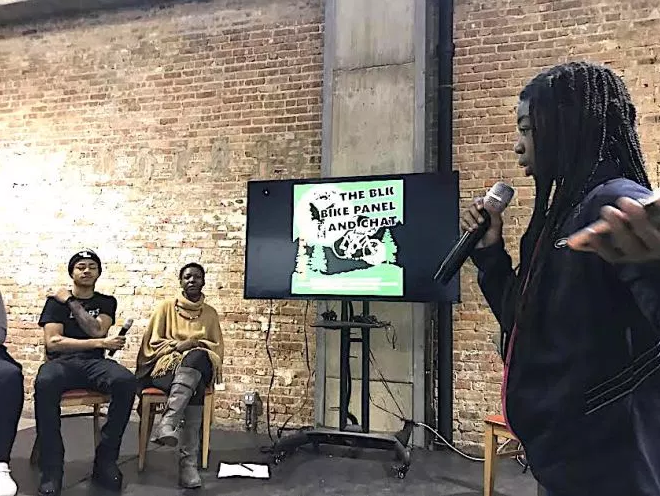This past Saturday, Woodlawn's Experimental Station, home of the Blackstone Bicycle Works community bike shop, brimmed with energy as people gathered for The Blk Bike Panel and Chat, an event meant to gather Black bicyclists to discuss barriers to cycling for African Americans, and ways to help encourage more people of color to ride bikes.
Event organizers D’Frantz Smart, Kahari Black, and Taryn Randle, kicked off the program with opening events. “I really wanted to have Black cyclists in the room and talk about being Black on a bike,” Smart said.
The forum was meant to highlight the contributions Black cyclists have made in the past and are making now. After the opening remarks a short documentary was screened on Marshall “Major” Taylor, who in 1899, became the first African-American world champion bike racer.
Next Bill Gaston of the Major Taylor Cycling Club of Chicago, gave a presentation on Major Taylor’s legacy to add some additional context. “Next time you put your leg over a bike, think of this man," Gaston said. He blazed a trail,” Gaston said. He added that, in many ways, Major Taylor opened the door for Black people in Chicago and elsewhere to take up cycling. A mural recently debuted on the Major Taylor Trail on the Far Southwest Side to honor his legacy.
Michael “Tekhen” Strode, who has been involved with Red Bike & Green Chicago, was not able to attend the event. Instead, we watched his remarks from a previously recorded video, which centered on how bikes can be an avenue for social change in our communities. “Biking is an individual act to reduce our carbon footprint, but also part of larger act to lead to systemic change by addressing environmental racism,” Strode remarked.
Strode also posed important questions about reimagining communities where cyclists feel safe. “What would it look like to have a walkable, bikeable community? What would it look like to have a community where everyone felt comfortable being on their bike and engaging with the built environment?”
After the video, the panelists convened for a discussion moderated by Xia Xiang W. They opened by describing their motivation to bike-ride. “I ride bikes because it’s the most free I’ve ever felt in my life and I’m the one propelling myself forward.”
Each panelist spoke of their involvement in biking and what motivates them. Aaron Davis, a Black bike mechanic, remarked on the importance of having more Black mechanics.
Randle, an urban farmer and member of the 2wheelgods bike group, remarked on first becoming involved in cycling when Randle lived in Los Angeles and started organizing group rides with Ovarian Psycos, "an all womyn of color bicycle brigade." "I started doing full moon rides [in Chicago] and formed 2wheel gods," Randle said. "We wanted to have a place for queer and black and brown queer people."
Xiang next asked the panelists about their identities and how it intersects with how and why they ride. “For me, the bike was always a way to get away from everything,” said Sean Hopkins, who works at SRAM, a local corporation that makes bike parts.
“I cycle because it’s fun,"Randle said. "It’s the only way I’ve been able to practice self-care. It feels like the most radical decision you can make.”
Building off the question of identity, Xiang asked the panelists how they define safety as Black cyclists. “I never see bike lanes in the hood,” Davis said. “We need bike lanes on 63rd Street.” (There are no bike lanes on 63rd east of Western Avenue.) Davis recalled living in Woodlawn and Englewood and being struck by drivers a couple of times. “Everyone deserves bike lanes because everyone bikes.”
Randle said that her definition of safety also involves feeling comfortable to be herself. “For me, safe places are places where I feel like I can be my most authentic self.”
Xiang next asked how African-American cycling groups can better collaborate to get more black Chicagoans on bikes. Mulubwa Munkanta, who also SRAM, said it’s partly about awareness because everyone is attracted to cycling for different reasons.
Randle proposed hosting more events to nurture conversations, “perhaps having more events where we can be off the wheels and get to know each other as humans and see how our riding styles connect or disconnect.”
On a related note, Xiang asked panelists to describe what a bikable community would look like in their minds. Munkanta said that in a perfect world he could leave park his bike and not have to worry about it being stolen.
Randle built on that theme to note that in an ideal community, everyone would have a bike that they’re able to ride and food would be growing everywhere.
At the end of the formal panel, a few audience questions were taken. One attendee from Logan Square asked about the perception of bike lanes as “white lanes,” installed mostly to benefit relatively affluent white people, or associated with gentrification and displacement. Randle said there’s a need to encourage more Black people to get on bikes and share the road.
“The reason why bike lanes are seen as white lanes is also because our communities have other needs that have not been met,” Xiang said.
The event closed with participants expressing hopes for more events that gather Black cyclists to discuss their experience and highlighting the purpose in having them. Blackstone Bikes provided free kids' bikes and SRAM donated water bottles.
“Our vision and the mission of this panel is super simple,” Smart said. “We want to get more Black folks on bikes.”






